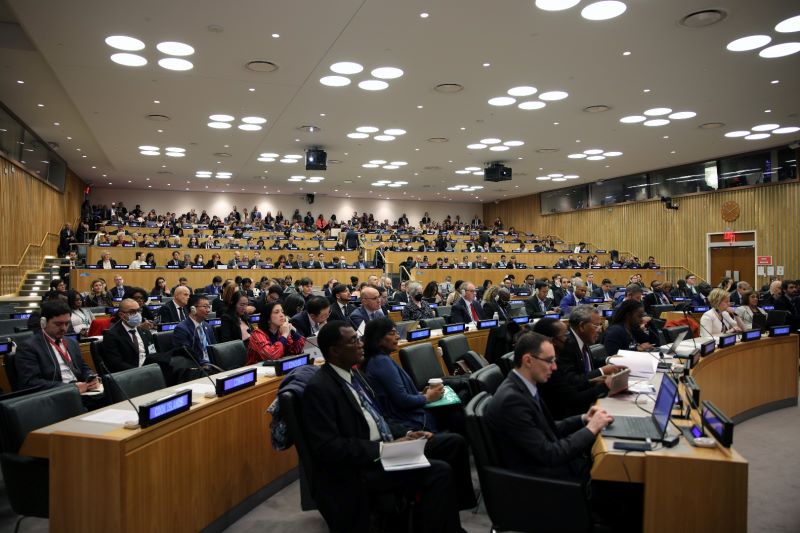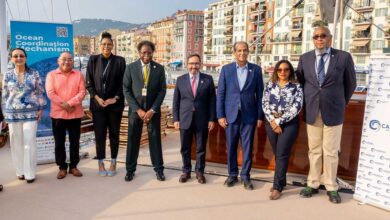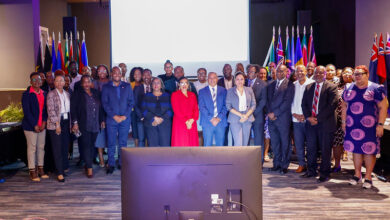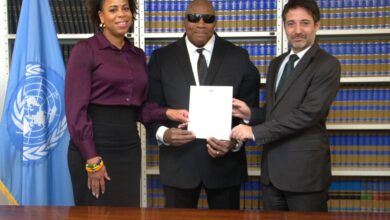March 4, 2023 marked a historic moment for the world’s oceans. After a marathon of intense, sometimes overnight negotiations, Member States of the United Nations agreed on the provisions of the ocean biodiversity treaty on the conservation and sustainable use of marine Biodiversity of areas Beyond National Jurisdiction (BBNJ).
With this treaty, a new chapter for equity in the world’s oceans has begun. Almost two decades ago, Small Island Developing and low-lying coastal States (SIDS) drew the international community’s attention to the governance gap for the ocean areas beyond national jurisdiction and the lack of any comprehensive regime to adequately regulate human activities in those areas. That gap posed a direct or indirect threat to the health of the marine environment including marine biodiversity with knock-on impacts for coastal nations and the planet. They also pointed to the inequitable use of these areas which SIDS consider to be the common heritage of humankind. From 2004 to 2015, together with other developing countries and the support of non governmental organisations, the SIDS led efforts to make the case for a new treaty. By 2018, that case was filed and an intergovernmental conference convened with a view to adopt a first ever ocean biodiversity treaty.
 The CARICOM Negotiating Team in New York
The CARICOM Negotiating Team in New York Dr. Kahlil Hassanali, Institute of Marine Affairs, Trinidad and Tobago CARICOM thematic lead on Part 4 of the Treaty, Environmental Impact Assessments
Dr. Kahlil Hassanali, Institute of Marine Affairs, Trinidad and Tobago CARICOM thematic lead on Part 4 of the Treaty, Environmental Impact Assessments Ambassador Janine Coye Felson, Overall CARICOM Team Lead and Thematic lead on Area Based Management Tools including Marine Protected Areas, Part 3 of the Treaty
Ambassador Janine Coye Felson, Overall CARICOM Team Lead and Thematic lead on Area Based Management Tools including Marine Protected Areas, Part 3 of the Treaty Mr. Kurt Davis, Government of Jamaica, CARICOM Thematic Lead on Part 6 of the Treaty, Institutional Arrangements
Mr. Kurt Davis, Government of Jamaica, CARICOM Thematic Lead on Part 6 of the Treaty, Institutional Arrangements Ms Donette Street, Government of Guyana, CARICOM Thematic Lead on Part 7 of the Treaty, Finanical Resources and Mechanisms
Ms Donette Street, Government of Guyana, CARICOM Thematic Lead on Part 7 of the Treaty, Finanical Resources and Mechanisms Ms. Juliette Babb- Riley, Government of Barbados, Overall CARICOM Team lead and CARICOM Thematic Lead for Marine Genetic Resources (Part 2 of the Treaty) with CARICOM Expert Professor Judith Gobin, Professor of Marine Biology, Department of Life Sciences, Faculty of Science and Technology, University of the West Indies, St. Augustine
Ms. Juliette Babb- Riley, Government of Barbados, Overall CARICOM Team lead and CARICOM Thematic Lead for Marine Genetic Resources (Part 2 of the Treaty) with CARICOM Expert Professor Judith Gobin, Professor of Marine Biology, Department of Life Sciences, Faculty of Science and Technology, University of the West Indies, St. Augustine Ms. Kimberly Louis, Government of St. Lucia, CARICOM Thematic Lead on Part 5 of the Treaty, Capacity Building and Transfer of Marine Technology
Ms. Kimberly Louis, Government of St. Lucia, CARICOM Thematic Lead on Part 5 of the Treaty, Capacity Building and Transfer of Marine Technology Ms. Nellie Catzim, Belize, CARICOM Technical Coordinator and support on Part 3 of the Treaty, area Based Management Tools including Marine Protected Areas
Ms. Nellie Catzim, Belize, CARICOM Technical Coordinator and support on Part 3 of the Treaty, area Based Management Tools including Marine Protected Areas Professor David Berry, Professor of International Law and Regional Integration Law, Faculty of Law, University of the West Indies, Cave Hill Campus CARICOM Expert supporting Area Based Management Tools and Institutional Arrangements
Professor David Berry, Professor of International Law and Regional Integration Law, Faculty of Law, University of the West Indies, Cave Hill Campus CARICOM Expert supporting Area Based Management Tools and Institutional Arrangements The CARICOM Negotiating Team in New York
The CARICOM Negotiating Team in New York Dr. Kahlil Hassanali, Institute of Marine Affairs, Trinidad and Tobago CARICOM thematic lead on Part 4 of the Treaty, Environmental Impact Assessments
Dr. Kahlil Hassanali, Institute of Marine Affairs, Trinidad and Tobago CARICOM thematic lead on Part 4 of the Treaty, Environmental Impact Assessments
Dr. Kahlil Hassanali, Institute of Marine Affairs, Trinidad and Tobago CARICOM thematic lead on Part 4 of the Treaty, Environmental Impact Assessments
From the outset, CARICOM demonstrated its leadership in the process with the Region’s representatives serving in different roles from the phases of the Preparatory Committee that determined the elements of the treaty, through to the five sessions of the Intergovernmental Conference that finalised the treaty itself. More importantly, its political leaders demonstrated the highest level of support for the conclusion of an ambitious framework for the conservation and sustainable use of marine biological diversity of areas beyond national jurisdiction, with a view to enabling equity and effectiveness. In a final statement ahead of the fifth intergovernmental conference, CARICOM Leaders declared their support for:
(a) a fair and equitable benefit sharing regime, including monetary and non-monetary benefits, for marine genetic resources of areas beyond national jurisdiction and digital sequence information on marine genetic resources that ensures all humanity for generations to come will benefit from utilisation of those resources and information;
(b) an inclusive transparent consultative process guided by science for the establishment of area-based management tools, including marine protected areas;
(c) a robust threshold and transparent process for the conduct of environmental impact assessments, with global oversight for activities that may be allowed and an agreed decision-making standard for activities that should not be allowed;
adequate, accessible, sustainable and predictable financing to support implementation of the BBNJ Agreement while delivering capacity-building and the transfer of marine technology to developing countries, in particular for SIDS and be responsive to their needs and priorities;
(e) additional funding arrangements for a liability mechanism;
(f) an effective framework of institutional arrangements that will support the provisions of the Agreement and ensure decision making based on the best available scientific information and incorporate the traditional knowledge of Indigenous peoples and local communities, facilitate effective capacity building and transfer or marine technology, and ensure the required generation of, access to, and use of funding towards the aims of the BBNJ Agreement; and finally;
(g) due recognition of the special circumstances of SIDS as an operational principle of the Agreement.
CARICOM welcomes the conclusion of the intergovernmental conference and the adoption of the ocean biodiversity treaty. The Community takes note with appreciation that the provisions of the treaty have met the Region’s core objectives. Importantly, CARICOM recognises that this new treaty lays a formidable foundation for the fair, equitable and sustainable use of the ocean and its resources in areas beyond national jurisdiction. CARICOM Member States will begin consideration of the next steps to become a party to the treaty and looks forward to the continued support of the international community in bringing the treaty into force and effect, and promoting its universality.






